
The iPhone 14 is the most affordable of Apple’s latest iPhone generation. However, the company continues to sell last year’s iPhone 13. Whether you’re considering an upgrade or looking to buy a new iPhone for the first time in several years, here’s everything you need to know about the iPhone 13 vs iPhone 14.
iPhone 13 vs iPhone 14: Display
The iPhone 13 and iPhone 14 feature 6.1-inch displays that Apple brands as Super Retina XDR screens. The specs for each of the devices are identical, including the same brightness, resolution, and colors:
- Super Retina XDR display
- 6.1-inch (diagonal) OLED display
- HDR display
- 2532-by-1170-pixel resolution at 460 ppi
- 2,000,000:1 contrast ratio (typical)
- True Tone display
- Wide color display (P3)
- Haptic Touch
- 800 nits max brightness (typical)
- 1200 nits peak brightness (HDR)
Note that unlike the iPhone 14 Pro and iPhone 14 Pro Max, neither the iPhone 13 nor the iPhone 14 feature a ProMotion display with up to 120Hz refresh rates. Instead, you’ll get a 60Hz refresh rate.
Design
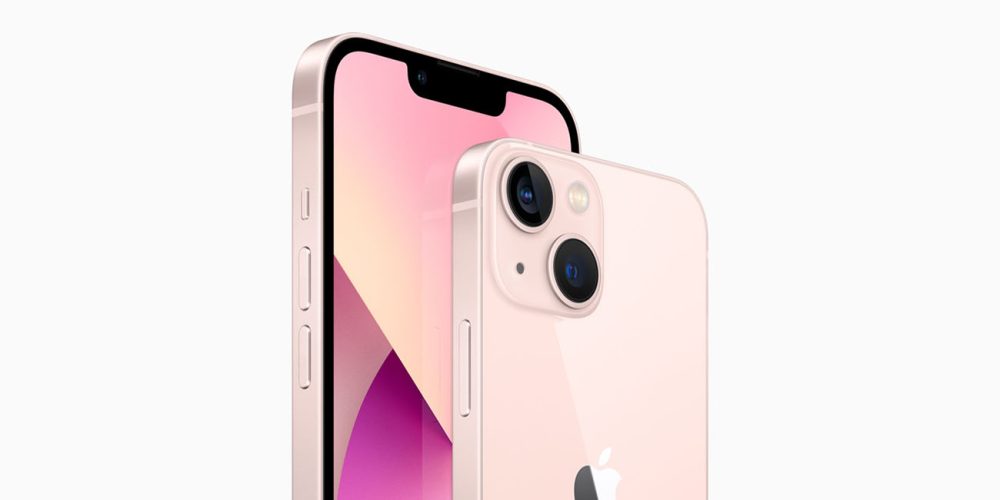
The iPhone 13 and iPhone 14 feature the same design we first saw with the iPhone 12 in 2020. This includes flat edges made out of aluminum, an edge-to-edge display on the front with Face ID, and a glossy finish on the back in the color of your choosing.
While the iPhone 14 Pro features a new Dynamic Island design to house the Face ID and front-facing camera components, the iPhone 14 uses the same notch design as the iPhone 13. The overall dimensions of the iPhone 14 are pretty much identical to the iPhone 13 as well. The only differences are the iPhone 14 is slightly thicker and slightly lighter.
iPhone 14 cases:
- Spigen Ultra Hybrid Clear Case
- TORRAS Magnetic Case for iPhone 14
- Caseology Silicone Case
- Spigen Thin Fit
Best iPhone 13 cases:
- TORRAS Slim Fit Compatible for Phone 13 Pro
- Caseology Vault Protective Case for iPhone 13 Pro
- Benjolf Clear Case for iPhone 13 Pro
iPhone 13 dimensions:
- Height: 5.78 inches (146.7 mm)
- Width: 2.82 inches (71.5 mm)
- Depth: 0.30 inch (7.65 mm)
- Weight: 6.14 ounces (174 grams)
iPhone 14 dimensions:
- Height: 5.78 inches (146.7 mm)
- Width: 2.82 inches (71.5 mm)
- Depth: 0.31 inch (7.80 mm)
- Weight: 6.07 ounces (172 grams)
The iPhone 13 and iPhone 14 are water, dust, and splash resistant with an IP68 rating for a maximum depth of 6 meters up to 30 minutes. The durability of the devices is also the same, with both featuring a Ceramic Shield front and aerospace-grade aluminum.
iPhone 13 vs iPhone 14: Performance
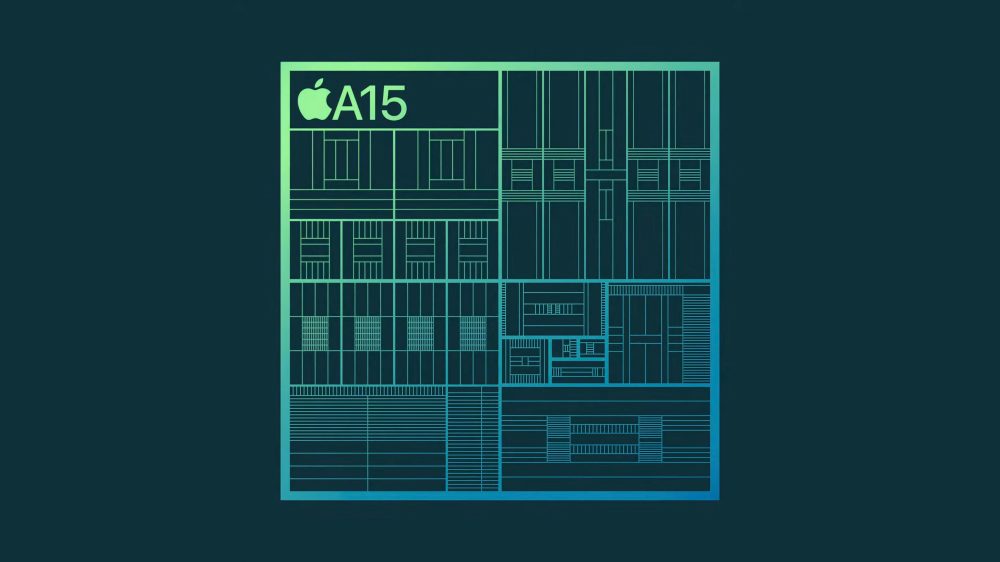
The performance of the iPhone 13 and iPhone 14 is close to identical, but there are a couple of ways the iPhone 14 has the upper hand. Both are powered by the A15 Bionic chip on the inside, but the version of the chip inside the iPhone 14 has an extra GPU core.
iPhone 13 chip:
- A15 Bionic chip
- 6-core CPU with 2 performance and 4 efficiency cores
- 4-core GPU
- 16-core Neural Engine
iPhone 14 chip:
- A15 Bionic chip
- 6-core CPU with 2 performance and 4 efficiency cores
- 5-core GPU
- 16-core Neural Engine
This difference is unlikely to affect day-to-day performance in the real world significantly. Perhaps more notable is that the iPhone 14 has 6GB of RAM, compared to the iPhone 13’s 4GB of RAM. This could help with longevity when it comes to new features being added to future versions of iOS.
Connectivity
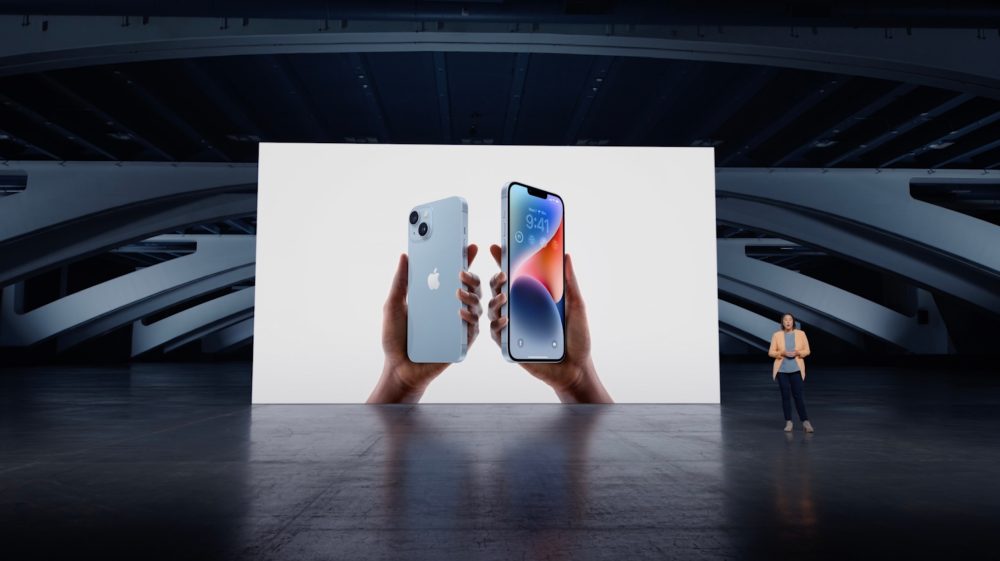
If you want 5G connectivity, the iPhone 13 and iPhone 14 both have you covered. Apple says this makes for “superfast downloads and high-quality streaming.” This includes support for mmWave 5G connectivity in the United States, as well as sub-6GHz 5G in the United States and other countries.
One notable change, however, is that the iPhone 14 being sold in the United States does not offer a physical SIM card slot. Instead, it relies purely on eSIM technology. You can learn more about this in our full guide right here.
Crash Detection and Emergency SOS
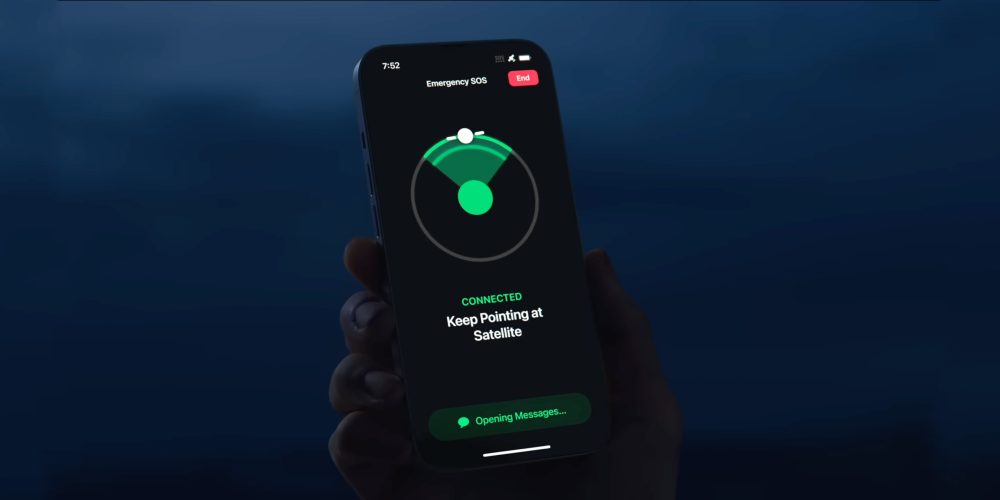
Apple continues to expand upon its collection of features designed to help you in emergencies. These are features you hope you never have to use but are nice to have just in case. Exclusive to the iPhone 14 are the following two features:
- Crash detection that can recognize when you’re in a car accident and call emergency services
- Satellite connectivity for reaching emergency services when you aren’t connected to a cellular or WiFi network
Rear cameras
The iPhone 14 offers a few improvements over the iPhone 13 in terms of rear-camera technology. There are still two lenses, the Main camera and the Ultra Wide camera. One change is the addition of what Apple calls the “Photonic Engine.”
Apple describes this as a new computational photography feature that offers a “giant leap for mid- to low-light performance in photos across all cameras through a deep integration of hardware and software.” On the iPhone 14, Apple says you can expect improved mid- to low-light performance of up to 2x on the Ultra Wide camera, 2x on the TrueDepth camera, and 2.5x on the Main camera in comparison to the iPhone 13.
| iPhone 14 | iPhone 13 | |
| Main camera | 12MP, ƒ/1.5 aperture | 12MP, ƒ/1.6 aperture |
| Sensor-shift optical image stabilization |
✅ | ✅ |
| Ultra Wide | 12MP, ƒ/2.4 aperture | 12MP, ƒ/2.4 aperture |
| Telephoto lens | ❌ | ❌ |
| Zoom | 2x optical zoom, 5x digital zoom | 2x optical zoom, 5x digital zoom |
| Apple ProRAW | ❌ | ❌ |
| Smart HDR 4 | ✅ | ✅ |
| Photonic Engine | ✅ | ❌ |
| Photographic Styles | ✅ | ✅ |
| Panoramas | ✅, 63MP | ✅, 63MP |
| Portrait mode | ✅ | ✅ |
Selfie camera
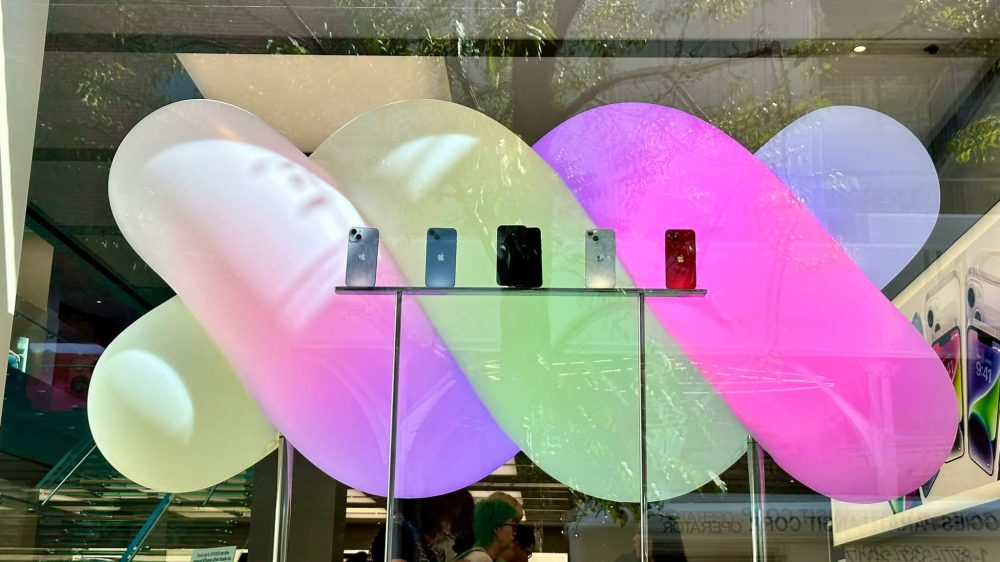
The iPhone 14 offers a notable jump in front camera performance. The front-facing selfie camera on the iPhone 14 has an ƒ/1.9 aperture that enables better low-light performance for photos and video. It also offers auto-focus for the first time, so it can focus in low light and capture group selfies from farther away.
Meanwhile, the iPhone 13 offers a 12MP front camera without autofocus and with an ƒ/2.2 aperture. This means that the iPhone 14 should signficantly out-perform the iPhone 13 in terms of front-facing camera performance.
Video recording
iPhone 14 camera tech for video:
- 4K video recording at 24 fps, 25 fps, 30 fps, or 60 fps
- 1080p HD video recording at 25 fps, 30 fps, or 60 fps
- 720p HD video recording at 30 fps
- Cinematic mode up to 4K HDR at 30 fps
- Action mode up to 2.8K at 60 fps
- HDR video recording with Dolby Vision up to 4K at 60 fps
- Slo‑mo video support for 1080p at 120 fps or 240 fps
- Time‑lapse video with stabilization
- Night-mode time-lapse
- QuickTake video
- Sensor-shift optical image stabilization for video (Main)
- 2x optical zoom out
- Digital zoom up to 3x
- Audio zoom
- True Tone flash
- Cinematic video stabilization (4K, 1080p, and 720p)
- Continuous autofocus video
- Take 8MP still photos while recording 4K video
- Playback zoom
- Video formats recorded: HEVC and H.264
- Stereo recording
iPhone 13 camera tech for video:
- HDR video recording with Dolby Vision up to 4K at 60 fps
- 4K video recording at 24 fps, 25 fps, 30 fps, or 60 fps
- 1080p HD video recording at 25 fps, 30 fps, or 60 fps
- 720p HD video recording at 30 fps
- Cinematic mode (1080p at 30 fps)
- Sensor-shift optical image stabilization for video (Main)
- 2x optical zoom out
- Digital zoom up to 3x
- Audio zoom
- True Tone flash
- QuickTake video
- Slo‑mo video support for 1080p at 120 fps or 240 fps
- Time‑lapse video with stabilization
- Night mode time-lapse
- Cinematic video stabilization (4K, 1080p, and 720p)
- Continuous autofocus video
- Take 8MP still photos while recording 4K video
- Playback zoom
- Video formats recorded: HEVC and H.264
- Stereo recording
Battery life
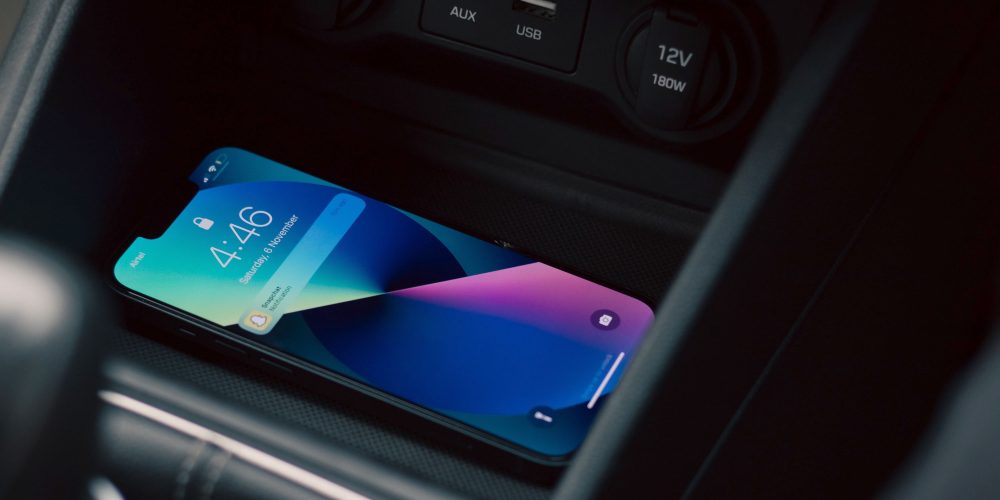
iPhone 13 battery estimates:
- Audio playback: 75 hours
- Video playback (streamed): Up to 15 hours
- Video playback: Up to 19 hours
iPhone 14 battery estimates:
- Audio playback: 80 hours
- Video playback (streamed): Up to 16 hours
- Video playback: 20 hours
The iPhone 13 and iPhone 14 both include a Lightning connector on the bottom and support for MagSafe connectivity on the back. There’s also support for 7.5W Qi wireless charging and 15W wireless charging when using a MagSafe wireless charger. Both devices support fast charging for getting up to a 50% charge in 30 minutes with a 20W power adapter.
iPhone 13 vs iPhone 14: Pricing and storage
iPhone 13:
- $699 – 128GB
- $799 – 256GB
- $999 – 512GB
iPhone 14:
- $799 – 128GB
- $899 – 256GB
- $1099 – 512GB
Colors
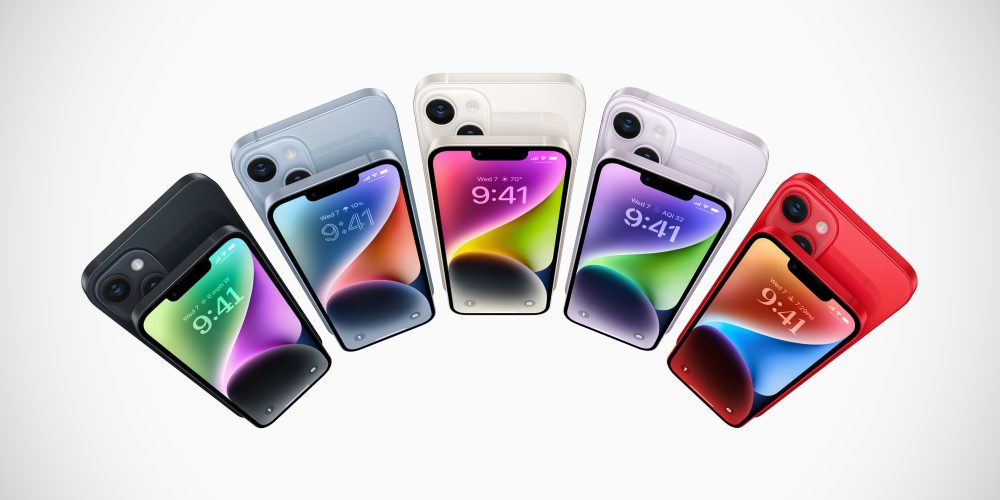
iPhone 13 colors:
- Midnight
- Starlight
- Blue
- (Product)RED
- Pink
- Green
iPhone 14 colors:
- Midnight
- Purple
- Starlight
- (Product)RED
- Blue
iPhone 13 vs iPhone 14: Feature comparison chart
| iPhone 14 | iPhone 13 | |
| Display | 6.1-inch Super Retina XDR OLED | 6.1-inch Super Retina XDR OLED |
| ProMotion Display | ❌ | ❌ |
| Finish | Aluminum | Aluminum |
| Processor | A15 Bionic | A15 Bionic |
| RAM | 6GB | 4GB |
| CPU cores | 6 cores | 6 cores |
| GPU cores | 5 core | 5 core |
| Durability | IP68 | IP68 |
| Battery life | Up to 20 hours video | Up to 19 hours video |
| Camera | Dual-lens 12MP | Dual-lens 12MP |
| Optical zoom range | 2x | 2x |
| Video | Dolby Vision HDR up to 4K at 60 fps | Dolby Vision HDR up to 4K at 60 fps |
| Optical Image Stabilization | ✅ | ✅ |
| Photographic Styles | ✅ | ✅ |
| Photonic Engine | ✅ | ❌ |
| Cinematic mode | ✅ | ✅ |
| Dual eSIM support | ✅ | ✅ |
| Physical SIM card slot | ❌ (Still offered outside US) | ✅ |
| 5G | ✅ | ✅ |
| Weight | 6.07 ounces (172 grams) | 6.14 ounces (174 grams) |
| Storage | 128GB, 256GB, 512GB | 128GB, 256GB, 512GB |
| Pricing | From $799 | From $699 |
What’s included in the box
Citing environmental concerns, Apple does not include headphones or a charging brick in the iPhone 13 or iPhone 14 boxes. Here are some accessories you might consider picking up to help fill that gap and complement your new iPhone.
- Native Union Drop 10W Qi Charger
- Anker 30W USB-C wall charger
- USB-C to Lightning cable
- Lightning to 3.5mm headphone adapter or cable
iPhone 13 vs iPhone 14
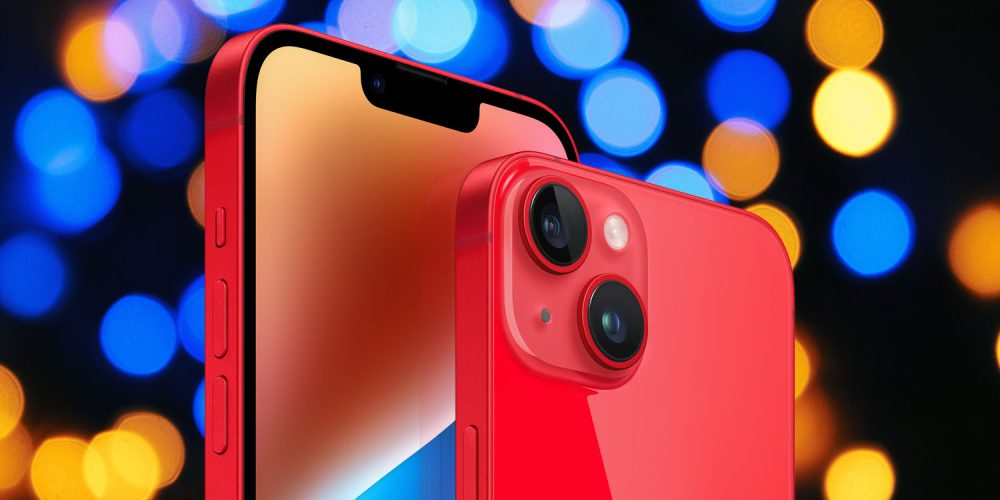
The differences between the iPhone 13 and iPhone 14 are minor. In fact, this might be one of the smallest year-over-year iPhone upgrades in recent memory. There are some improvements to the camera along with the addition of features like Crash Detection and Emergency SOS via Satellite.
Because of the minor changes, however, it’s hard to reccomend anyone who currently has an iPhone 13 to upgrade to the iPhone 14. In day-to-day use, many of the changes won’t be noticeable. The design is the same, the performance is nearly identical, and battery life is about the same. In fact, it’s also hard to reccomend upgrading from the iPhone 12 to the iPhone 14.
If you’re using something like an iPhone 11 or older, you’ll notice some bigger changes when you jump all the way to the iPhone 14. The cameras will be noticeably better, there’s a nice boost in performance, and you should benefit from some improvements to battery life.
If you’re shopping for a new iPhone, this is a tricky decision to make. For many people, the iPhone 13 is more than enough. You still get excellent performance, a great camera, and a modern design for $100 less than the iPhone 14. If you have the money to spend, however, you should consider going for the iPhone 14 because of those camera upgrades.
What do you think of the iPhone 13 vs. iPhone 14 debate? Are you planning to buy a new iPhone this year? Let us know down in the comments!
Wondering about the iPhone 14 vs iPhone 14 Pro? Check out our full comparison for more.
Author: Chance Miller
Source: 9TO5Google



